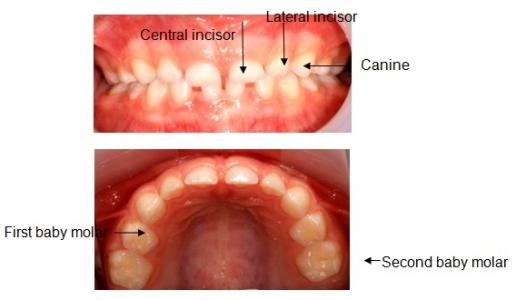Teething
Author: Dr Narisha Chawla
Teething is a rite of passage that all children (and parents!) have to endure.
Baby teeth form while your child is still in the womb. By the time they are born, all 20 baby teeth have formed and are hidden under the gums. Baby teeth are also known as milk teeth, primary teeth or deciduous teeth.
First set of teeth
Children have 10 teeth in the top jaw and 10 teeth in the bottom jaw. Most kids get the full set of 20 baby teeth by the time they are 3 years old. The four top and four bottom front teeth are called “incisors”. The pointy teeth on either side, two in the top jaw and two in the bottom jaw, are called “canines”. The four top and four bottom back teeth with flat chewing surfaces are called “molars”.

What is teething?
Teething is the process of tooth appearing or erupting from the gum, which happens in a two stage process.
Most children get their first teeth between the ages of 4 to 15 months. Teething takes about 8 days, which includes 4 days before and 3 days after the tooth comes through the gum.
After the teething process is complete, most children have 10 teeth in the top jaw and 10 teeth in the bottom jaw, which should fully appear by the time they are three years old.
The four top and bottom front teeth are called incisors. The pointy teeth on either side of the incisors are called canines and there are two in the top jaw and two in the bottom jaw. The four top and four bottom back teeth with flat chewing surfaces are called molars.
Around the same age that children get their first teeth, which is from about 6 months until and their last baby tooth appears at around 30 months, their immune systems are also changing.
Most kids this age like to pick things up and put them in their mouths. The change in the immune systems and the tendency to put things in their mouths make them more prone to feeling unwell. Symptoms like fussiness, rash, drooling, runny nose, diarrhea, and changes in sleeping and eating patterns are often blamed on teething.
If your child has these symptoms, make sure that they are not suffering from other bacterial, viral or middle ear infections and consult your GP.
From 18 months old, all children benefit from regular dental check-ups to ensure their teeth are healthy through to adulthood. To make an appointment at Lucas Dental for your child, call our friendly reception staff on (03) 9824 7614.
About the Author:
Dr Narisha Chawla has a Bachelor of Dental Science (Honours) and a Doctorate of Clinical Dentistry in Paediatric Dentistry. Narisha also worked as a Specialist Paediatric Dentist at the Royal Children’s Hospital of Melbourne before joining Lucas Dental Care.
Narisha is passionate about all aspects of dentistry, particular in promoting better dental health in children to ensure they continue to have bright smiles throughout life.


Leave a Reply
Want to join the discussion?Feel free to contribute!